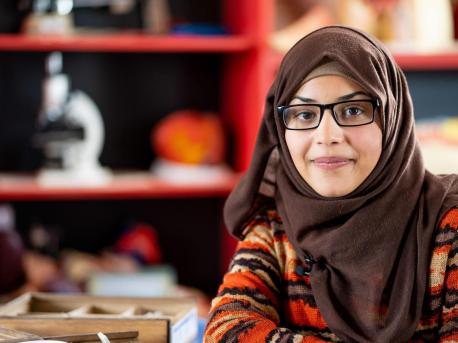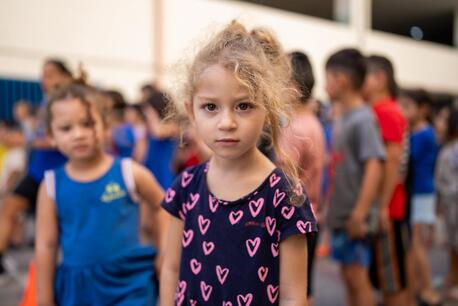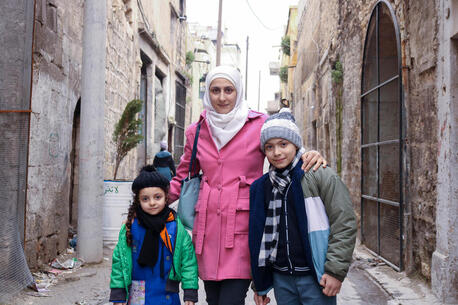
For a Young Syrian Refugee, Dreams of Space Flight & Family Reunions
In 2014, a 12-year-old girl named Bodoor and her family were forced out of their home by political violence in Syria.
They found shelter in Azraq Refugee Camp in Jordan, where Bodoor studied hard at the UNICEF-supported school. Her favorite subject was astronomy, and she dreamed of one day becoming Syria's first woman in space.
In the video below, made when she was 18, Bodoor gives viewers a tour of her family's home in the refugee camp and her school, and talks about her hopes for the future. "When she gets an education, she will not be under anyone's shadow or control," says her mother. "When she gains an education, she will open the locks of the world and face any challenges that come her way, live independently and have her own opinions."
Growing up in Azraq Refugee Camp, Bodoor dreamed of becoming Syria's first woman astronaut
Now Bodoor is 19, studying renewable energy and hoping to get a job at a space agency. She has another dream: of one day seeing her uncle again. She hasn't seen him in a decade, since before the war began. "I hope that one day, I will see him again, and show him what I have become," she says. "I don't know if he will recognize me, but I think he will because he loves me so much."
Now 19, she's studying renewable energy — and hoping that someday her family will be reunited
"Across Syria, nearly 90 per cent of children now require humanitarian assistance; 3.2 million inside Syria and neighboring countries are out of school," UNICEF Executive Director Henrietta Fore said in a U.N. Security Council briefing in March. "They’re vulnerable to violence, exploitation, early marriage, child labor or being forced to join the fighting. The number of families reporting that their children were suffering from psychological distress has doubled in the last year."
UNICEF and partners are working to provide children caught up in Syria's humanitarian crisis with the supplies and services they urgently need
Since the Syrian conflict began a decade ago, UNICEF and partners have been on the ground in Syria and surrounding host countries working to provide children and families caught up in this humanitarian crisis with the essential supplies and services they need to survive, including health care, immunizations, education, protection and access to safe water, sanitation and hygiene (WASH).
Some 5.6 million registered refugees from Syria — among them 2.5 million children — are living in Egypt, Iraq, Jordan, Lebanon and Turkey. In 2021, UNICEF requires US$1 billion to respond to the most immediate needs of Syrian refugees, including their education and WASH needs, which have increased substantially due to the COVID-19 pandemic.
Top photo: Bodoor, 17, in the science lab of her UNICEF-supported school in Azraq refugee camp in Jordan in 2018. She and her family settled in Azraq after fleeing violence in Syria in 2014. © UNICEF/UN0263756/Herwig
HOW TO HELP
There are many ways to make a difference
War, famine, poverty, natural disasters — threats to the world's children keep coming. But UNICEF won't stop working to keep children healthy and safe.
UNICEF works in over 190 countries and territories — more places than any other children's organization. UNICEF has the world's largest humanitarian warehouse and, when disaster strikes, can get supplies almost anywhere within 72 hours. Constantly innovating, always advocating for a better world for children, UNICEF works to ensure that every child can grow up healthy, educated, protected and respected.
Would you like to help give all children the opportunity to reach their full potential? There are many ways to get involved.





